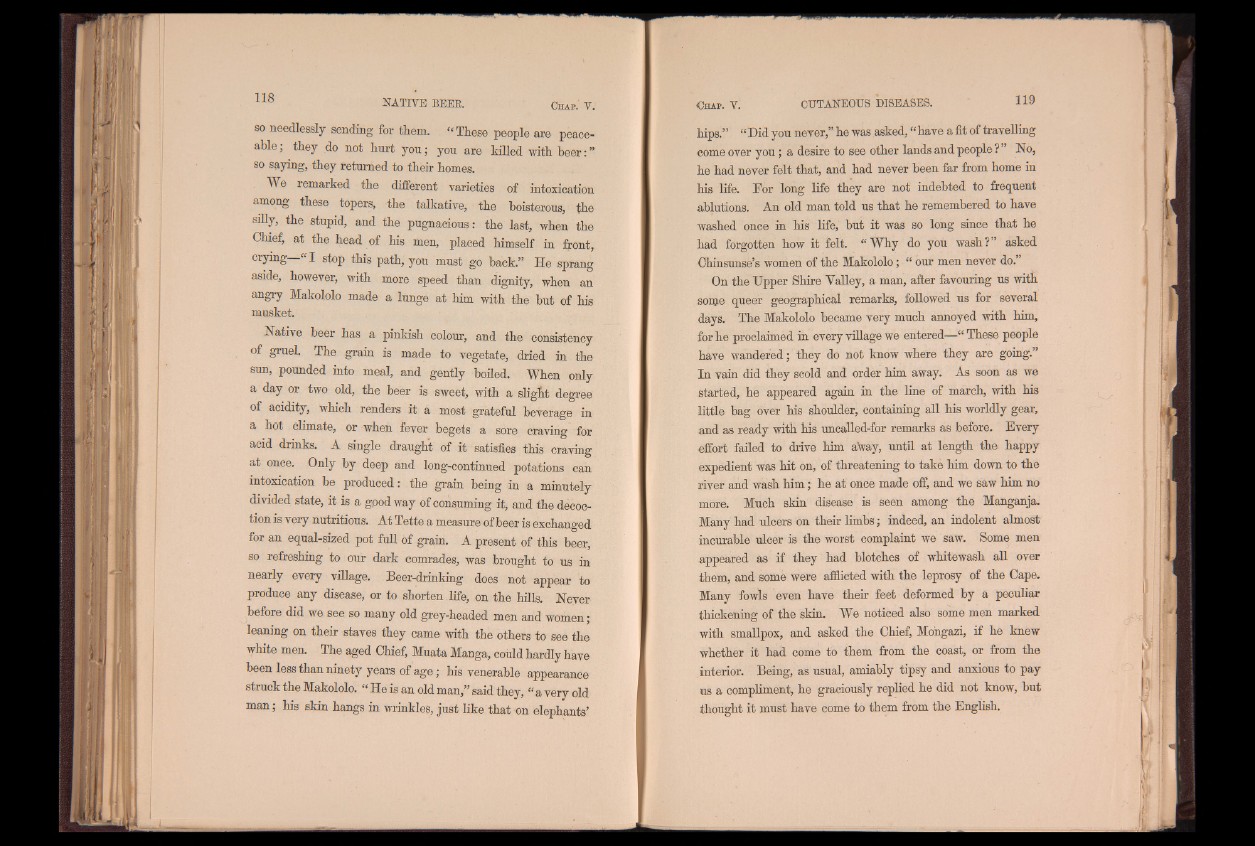
so needlessly sending for them. “ These people are peaceable;
they do not hurt you; you are killed with beer:”
so saying, they returned to their homes.
We remarked the different varieties of intoxication
among these topers, the talkative, the boisterous, the
silly, the stupid, and the pugnacious: the last, when the
Chief, at the head of his men, placed himself in front,
crying—“ I stop this path, you must go back.” He sprang
aside, however, with more speed than dignity, when an
angry Makololo made a lunge at him with the but of his
musket.
Native beer has a pinkish colour, and the consistency
of gruel. The grain is made to vegetate, dried in the
sun, pounded into meal, and gently boiled. When only
a day or two old, the beer is sweet, with a slight degree
of acidity, which renders it a most grateful beverage in
a hot climate, or when fever begets a sore craving for
acid drinks. A single draught of it satisfies this craving
at once. Only by deep and long-continued potations can
intoxication be produced: the grain being in a minutely
divided state, it is a good way of consuming it, and the decoction
is very nutritious. At Tette a measure of beer is exchanged
for an equal-sized pot full of grain. A present of this beer,
so refreshing to our dark comrades, was brought to us in
nearly every village. Beer-drinking does not appear to
produce any disease, or to shorten life, on the hills, Never
before did we see so many old grey-headed men and women;
leaning on their staves they came with the others to see the
white men. The aged Chief, Muata Manga, could hardly have
been less than ninety years of age; his venerable appearance
struck the Makololo. “ He is an old man,” said they, “ a very old
man; his skin hangs in wrinkles, just like that on elephants’
hips.” “Did you never,” he was asked, “have a fit of travelling
come over you; a desire to see other lands and people ? No,
he had never felt that, and had never been far from home in
his life. For long life they are not indebted to frequent
ablutions. An old man told us that he remembered to have
washed once in his life, but it was so long since that he
had forgotten how it felt. “Why do you wash?” asked
Chinsunse’s women of the Makololo; “ our men never do.
On the Upper Shire Valley, a man, after favouring us with
some queer geographical remarks, followed us for several
days. The Makololo became very much annoyed with him,
for he proclaimed in every village we entered—“ These people
have wandered; they do not know where they are going.”
In vain did they scold and order him away. As soon as we
started, he appeared again in the line of march, with his
little bag over his shoulder, containing all his worldly gear,
and as ready with his uncalled-for remarks as before. Every
effort failed to drive him away, until at length the happy
expedient was hit on, of threatening to take him down to the
river and wash him; he at once made off, and we saw him no
more. Much skin disease is seen among the Manganja.
Many had ulcers on their limbs; indeed, an indolent almost
incurable ulcer is the worst complaint we saw. Some men
appeared as if they had blotches of whitewash all over
them, and some were afflicted with the leprosy of the Cape.
Many fowls even have their feet deformed by a peculiar
thickening of the skin. We noticed also some men marked
with smallpox, and asked the Chief, Mongazi, if he knew
whether it had come to them from the coast, or from the
interior. Being, as usual, amiably tipsy and anxious to pay
us a compliment, he graciously replied he did not know, but
thought it must have come to them from the English.